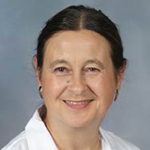The biggest change for us has been the clinical training,’ says Dr. Kolfenbach, noting that his rheumatology trainees have various specialty rotations & some have been stopped as a result of pandemic pressures & priorities.
Well-Being

Dr. Lohr
Adjusting to technological changes that improve safety for both patients and staff is easier to achieve compared with the ongoing effort to keep everyone feeling well physically, mentally and emotionally. The separation from ordinary, everyday interaction and routine can lead to feelings of isolation, notes Dr. Libman.
“I try to keep lines of communication open and ask how people are doing,” says Dr. Libman. “Even small talk or a brief hello can be a powerful way to connect with and support each other.”
Aside from career challenges for fellows, the pandemic takes a toll on personal lives, too.
“One first-year fellow took her vacation in her apartment, instead of visiting the beach—definitely a disappointment,” Dr. Lohr says. “She’s concerned about her boyfriend, a neurology fellow in Michigan [who was] called on to cover internal medicine patients.
“Since the other first-year fellow’s daughter interrupts her studying, she studies in our administrative assistant’s office,” she adds. “Her husband is finishing his degree in another state, but visited for a while. Both first-year fellows are in the process of job seeking, but obviously not traveling.”
On the bright side, being able to study from home has reduced childcare costs for a pair of second-year fellows training with Dr. Lohr. “Their older daughter is restless staying indoors, so they visited my back pasture to walk outdoors,” she says.
Catherine Kolonko is a medical writer based in Oregon.



